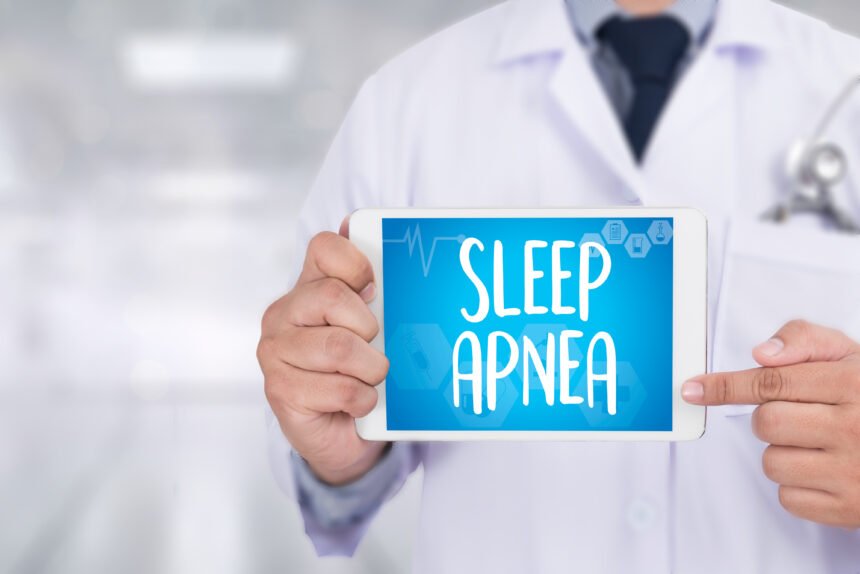The importance of getting enough sleep is well-known, but 1 in 3 adults claim they don’t get enough sleep. And for the 22 million adults in the United States that have sleep apnea, getting enough sleep is even more critical. But many factors make it difficult for those with sleep apnea to get a decent night’s sleep. One of those is weight gain. There’s some research to suggest that sleep apnea and weight gain go hand in hand. In this article, we will outline some of the discoveries that are coming to light.
What Is Sleep Apnea?
Sleep apnea is a sleep disorder that causes the individual to stop breathing and then start again during sleep – anywhere from 15 seconds up to one minute. The reason for this interrupted breathing is due to a blocked airway passage. The person uses a sleep apnea machine at night, called a CPAP, to ensure their breath stays consistent. There are three different types of sleep apnea: obstructive, central, and complex. Each syndrome has its level of severity, with obstructive being the most common. Sleep apnea can lead to a host of other problems that can make daily life challenging. Frequently feeling fatigued is the most common symptom, while others such as high blood pressure, the onset of diabetes, liver problems, heart problems, and the lack of sleep that other people in your home may experience.
What Is a CPAP Machine?
The device that people with sleep apnea use to help regulate their breathing is called a CPAP, or Continuous Positive Airway Pressure. This is the most common form of treatment for those with sleep apnea. The machine is worn over the face and head and works to keep airways open while sleeping. A CPAP machine needs care continuously to make sure it works properly. Regular cleaning and maintenance with products like Virtuclean 2.0, are vital to the health of the CPAP and you!
What’s the Connection Between Sleep Apnea and Weight Gain?
Having sleep apnea can contribute to excess weight gain and worsen sleep apnea. When our bodies don’t get the rest that we need, they don’t work as efficiently. Also, the more tired you are, the less motivation and energy you have to exercise. These two factors are the reasons why weight gain is so prevalent for those with sleep apnea. Another thing to consider is that excess weight can obstruct breathing during sleep. If the individual is not exercising, and gaining weight rapidly, this causes the body to work hard and could lead to more severe problems with sleep apnea.
Dangers of Not Getting Enough Sleep
The power of sleep should not be underestimated. As you sleep, your body does specific things to repair itself. One area where this is seen is with our hormones. Hormones are chemical substances in our bodies that carry messages. There are two hormones affected by lack of sleep, and they are ghrelin and leptin. Ghrelin tells our bodies to eat, and leptin tells our bodies to stop eating. Sleep deprivation causes more ghrelin to be produced in the body, and at the same time, less leptin. The combination of these factors leads to weight gain over time. Insulin also becomes a problem, because lack of sleep causes our cells to reject insulin and make less leptin.
Weight Loss Tips
Other factors contribute to sleep apnea other than losing weight. Losing weight is not a cure-all for sleep apnea. However, maintaining your weight at a healthy level is vital to get enough sleep and produce an overall healthy body. Here are some weight-loss tips:
1. Exercise
Exercise does not have to be rigorous, especially if you’re sleep deprived! A 30-minute walk or stretching session is enough to put you on the right path. The important thing is that you’re moving and elevating your heart rate.
2. Eating Better Foods
Exercise can only get you so far without proper eating habits. Start by eating foods high in protein, which keeps you alert and focused. Fruits, vegetables, and whole grains are great choices to give you energy and cut back on processed foods.
3. Step Away From the Sugar
It’s tempting when you’re fatigued to grab an energy drink or other sugar-laden drink to perk you up. Resist the temptation! Sugar packs on the pounds and spikes up insulin levels. Stick to water, coffee, or unsweetened tea. People who drink water thirty minutes before they eat shows that they end up eating less.
4. Get Enough Sleep
Sleep is key! Do your best to get as much sleep as you can. Go to bed earlier or start a bedtime routine to clue your body into realizing that it’s time to settle down.
Is There a Cure for Sleep Apnea?
There is currently no cure for sleep apnea, but more but some experts suggest that losing weight could eliminate sleep apnea. Others disagree and argue that there are other elements as to why someone would be diagnosed with sleep apnea. The CPAP is only one therapy option, and more are becoming available as technology advances, and sleep apnea research is ongoing.
Sleep Apnea and Weight Loss: Takeaway
The discoveries made between sleep apnea and weight gain are encouraging. It uncovers much we didn’t know before, and we can use this information to help people live better lives. If you are suffering from sleep apnea, what lifestyle changes would you consider making? Are you interested in all things health-related? Get the latest scoop here at our website!







